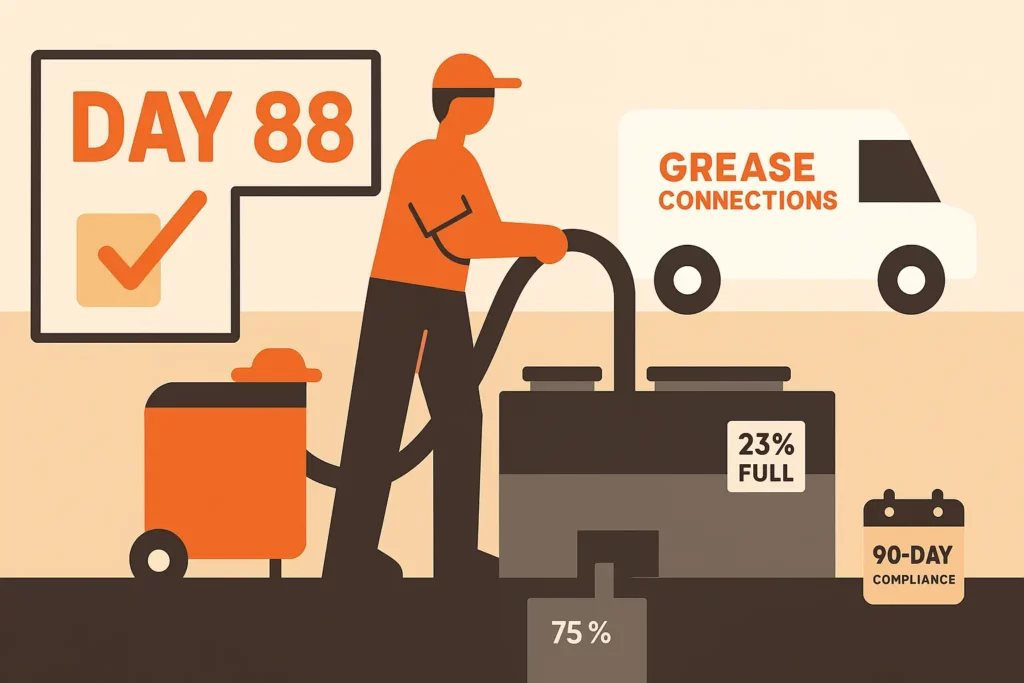Table of Contents
Why FOG compliance matters in Atlanta
Grease clogging isn’t abstract half of Atlanta’s sewer blockages trace back to restaurant drains, according to the City’s Grease Management Program. When a trap overflows, inspectors can fine up to $1,000 per day under Chapter 154, Article V. Recent sewer spills cost the city almost $300,000 proof that regulators are watching. A single violation can also void insurance coverage and spike premiums, the Georgia EPD warns. In short, clean plumbing protects waterways, keeps kitchens open, and safeguards profit.

The legal layer decode city & county rules
Atlanta requires every food establishment to hold a Food Service Wastewater Discharge Permit; fees start at $300 for up to five traps. Fulton County restaurants outside city limits still need a county FOG certificate ($250) and must apply through the new web based Pretreatment Portal. Both codes lock in the 90 day/25 percent pump rule: service the interceptor every three months or sooner if grease reaches one quarter depth. Pump out manifests must be uploaded to GreaseTrack within 14 days, tying paperwork to the city database. Skipped uploads trigger escalating fines and surprise re inspections.
The one page Atlanta FOG compliance checklist (download link below)
| Compliance Item | Atlanta Specific Requirement | Why it matters |
|---|---|---|
| Permit in hand | City discharge permit ($300) or Fulton certificate ($250) current, copy near sink | Inspectors ask for it first |
| Interceptor service | Pump every 90 days or 25 % full, whichever comes first | Avoid instant violation tickets |
| Manifests filed | Upload PDF/JPEG to GreaseTrack portal within 14 days | Digital trail shows due diligence |
| Staff training | Documented SOP: never pour oil down drains; wipe, don’t hose | City BMPs list training as inspection metric |
| Spill kit & log | Absorbent pads, labeled bin, incident sheet within reach | Demonstrates proactive prevention |
| Used oil storage | Sealed 70 to 300 gal steel tank, 110 % secondary containment | Meets GA EPD containment rule |
| Collection company contract | Licensed recycler ID on file; RFID or photo receipts | Confirms legal end point disposal |
Download the Atlanta FOG Checklist (Excel)
Implementation playbook turning rules into habits
Start with a 15 minute “drain audit.” Walk from fryer to sink, mapping every pipe that touches grease. Note trap size and last pump date most managers find they’re two weeks late. Schedule quarterly service dates in a shared calendar so no one forgets.
While the trap is open, have employees observe; the smell alone cements the 25 percent rule in memory. Immediately scan the hauler’s manifest and upload it to GreaseTrack doing it later risks forgetting. Post a one page SOP above the mop sink: scrape, wipe, absorb, never hose. Reinforce it at shift change with a two sentence reminder. These micro routines turn code into muscle memory and keep the fines away.
Common pitfalls & inspection triggers
Most violations stem from paperwork, not plumbing. An otherwise spotless kitchen fails when manifests sit in a desk drawer instead of the portal. Another trap: letting a used oil tank fill past 90 percent one windy lid lift and grease splashes onto pavement, classed as an unpermitted discharge. Inspectors also zero in on interiors where drains show “polished metal” a tell tale of hot oil dumping. Finally, contractors who pump traps but skip line jetting leave residue that solidifies downstream; three clogged feet can back up an entire block and draw EPA scrutiny. Prevent each trigger with digital reminders, level sensors, and reputable collection companies.
Next steps
Download the excel, copy the dates into your calendar, and book your next pump today. If you also operate in Savannah or Augusta, our city specific guides explain the extra coastal and CSRA nuances. Staying ahead of FOG rules everywhere keeps your brand spotless and your fryers sizzling.
FAQs
How often must Atlanta restaurants pump grease traps? Every 90 days or when grease reaches 25 percent of capacity, whichever comes first.
Where do I upload pump out manifests? Log into the City’s GreaseTrack portal and add the PDF within 14 days of service.
What happens if I miss a manifest? The city can issue a non compliance notice; repeat lapses escalate to $1,000 a day fines.









